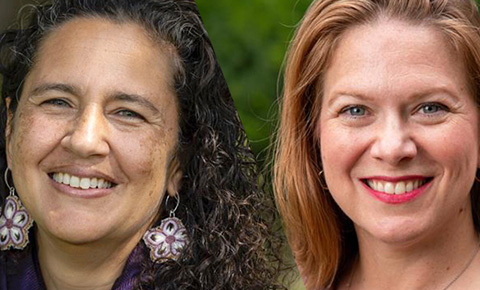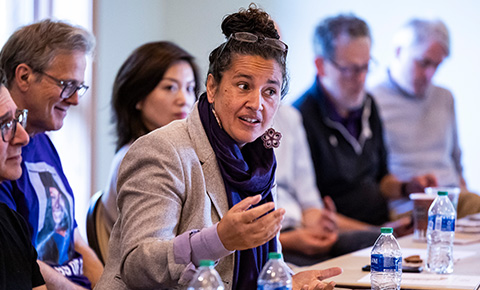Bang, Tipton Named AERA Fellows

Northwestern University scholars Megan Bang and Elizabeth Tipton were named 2024 American Educational Research Association (AERA) Fellows for their outstanding contributions to the field.
Bang, professor of learning sciences in the School of Education and Social Policy, has spent much of her career studying what teaching and learning could–and should–look like in a world with a changing climate and human cognition as it relates to sustainability.
A member of the National Academy of Education and its Board of Advisors, she is the director of Northwestern’s Center for Native American and Indigenous Research.
Tipton, professor of statistics and data science in the Weinberg College of Arts and Sciences, has a courtesy appointment in the School of Education and Social Policy. She co-directs the Statistics for Evidence-Based Policy and Practice, or STEPP, Center at Northwestern’s Institute for Policy Research with statistician and education researcher Larry Hedges. Her research examines how to improve the ability to generalize findings from experiments to relevant populations through better design and analysis, especially in education and psychology.
Bang and Tipton both Northwestern University alumni, were nominated by their peers and are among 24 new scholars named to AERA’s Fellows Program. They will be inducted during the 2024 Annual Meeting in Philadelphia on April 12. They join a large family of 762 AERA Fellows, including twelve from the School of Education and Social Policy.
Megan Bang:
 One of Bang’s most ambitious projects is Learning in Places, a field-based transdisciplinary education model for elementary school-age children and beyond that is currently being implemented in seven states across the country.
One of Bang’s most ambitious projects is Learning in Places, a field-based transdisciplinary education model for elementary school-age children and beyond that is currently being implemented in seven states across the country.
As a routine part of their school day, children are immersed in outdoor based learning in science and literacy as well as in civics and social studies. The model “bakes in” equitable approaches to education as well as socio-emotional dimensions of learning and wellbeing, Bang said.
Bang, who serves on the Board of Science Education at the National Academy of Sciences, is the principal investigator of the effort, which prepares students to wrestle with and engage in creating change around issues of socio-ecological justice such as food sustainability and water use.
“Megan has forced us to reimagine what it means to have places and nature be a pedagogical partner to help transform schooling in the 21st century,” said School of Education and Social Policy Dean Bryan Brayboy. “One of her superpowers is that she demands us to re-think taken-for-granted notions of how structures (like schooling and learning) can and should work.”
After graduating from Williams College in Massachusetts, Bang earned her PhD in learning sciences at SESP in ’09 while also working at the American Indian Center of Chicago.
“My dad had taught me about work life and managing multiple endeavors,” she told SESP Magazine in 2019. “I became deeply interested in how education, instead of being a source of trauma, had the potential to heal Native communities—and all communities, really. For me, this is always tied to relations with land and water, and I believe the 21st century is the time when all human communities need to learn sustainable and just ways of living.”
Bang was a faculty member at the University of Washington in Seattle before returning to Chicago to serve as senior vice president of the Spencer Foundation, which funds educational research and training. At the same time, she joined the SESP faculty as professor of learning sciences.
“My scholarship focuses on culture, families, and STEAM education and the design of transformative learning environments,” she said. “I want to know: How do we create systems of education that can cultivate just, sustainable, and thriving communities?”
Elizabeth Tipton:
Tipton, a fellow at the Institute for Policy Research, has spent her career developing statistical methods and tools to help researchers better connect their findings to the populations in need of evidence. In 2017, she created and launched The Generalizer, a free online tool that is a “one-stop shop” for designing randomized studies in education. The Generalizer helps researchers leverage data on the population of schools in the United States to recruit more diverse and representative samples than are typical in experiments.
Her cross disciplinary work includes collaborations with Stanford psychologist Carol Dweck and others to develop the methodology for a groundbreaking experiment showing how a brief growth mindset intervention can raise high schoolers’ grades.
She also co-authored a recent report for the Institute for Education Sciences that outlined five key priorities for funding education research over the next decade, including a greater focus on equity.
"The study of statistics means nothing unless it’s applied in the name of improving lives,” Tipton said. “As a statistician, there is no higher honor than being recognized by a field so intentional about the goal of making education better for those who need it the most."
Tipton earned her PhD in statistics from Northwestern University in 2011, where she was a fellow in the Multidisciplinary Program in Education Sciences. In 2005, she earned a master’s in sociology from the University of Chicago and in 2001 a bachelor’s in mathematics from Transylvania University in Lexington, Kentucky. Prior to returning to Northwestern University, she was a member of the faculty at Teachers College, Columbia University for seven years.
“She’s a rare statistician whose work reflects an abiding concern for the ways statistics can advance the science to which it is applied,” said Hedges, the Board of Trustees Professor of Statistics at Northwestern. “She pays attention to the important problems education researchers face, like how to ensure that their research is relevant to real education settings. Her work is widely recognized and has helped improve education research.”